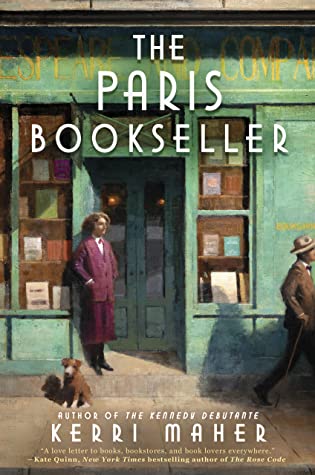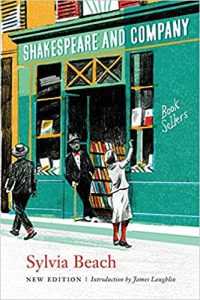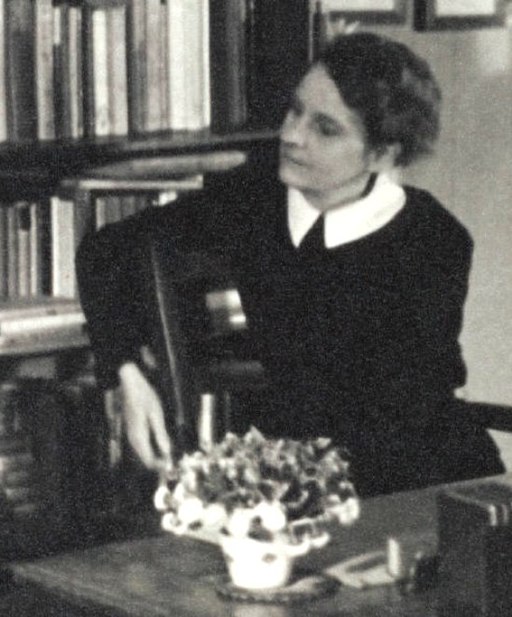 The Paris Bookseller by Kerri Maher
The Paris Bookseller by Kerri Maher Format: eARC
Source: supplied by publisher via Edelweiss
Formats available: hardcover, ebook, audiobook
Genres: historical fiction
Pages: 336
Published by Berkley Books on January 11, 2022
Purchasing Info: Author's Website, Publisher's Website, Amazon, Barnes & Noble, Kobo, Bookshop.org
Goodreads
The dramatic story of how a humble bookseller fought against incredible odds to bring one of the most important books of the 20th century to the world in this new novel from the author of The Girl in White Gloves.
When bookish young American Sylvia Beach opens Shakespeare and Company on a quiet street in Paris in 1919, she has no idea that she and her new bookstore will change the course of literature itself.
Shakespeare and Company is more than a bookstore and lending library: Many of the prominent writers of the Lost Generation, like Ernest Hemingway, consider it a second home. It's where some of the most important literary friendships of the twentieth century are forged--none more so than the one between Irish writer James Joyce and Sylvia herself. When Joyce's controversial novel Ulysses is banned, Beach takes a massive risk and publishes it under the auspices of Shakespeare and Company.
But the success and notoriety of publishing the most infamous and influential book of the century comes with steep costs. The future of her beloved store itself is threatened when Ulysses' success brings other publishers to woo Joyce away. Her most cherished relationships are put to the test as Paris is plunged deeper into the Depression and many expatriate friends return to America. As she faces painful personal and financial crises, Sylvia--a woman who has made it her mission to honor the life-changing impact of books--must decide what Shakespeare and Company truly means to her.
My Review:
Sylvia Beach is one of those people who, if she hadn’t existed, someone would have had to invent her. Her story reads like one of those that, if it were truly fictional, would be a bit too over-the-top to be believed.
 But, as happens more often than we think, it’s only fiction that has to be plausible. History just has to be true. And this story, or at least the big, important, supporting bones of this story, are that. Or close enough. (Beach herself wrote a memoir of this period, titled, of course, Shakespeare and Company. There is also a well-known biography of Beach by Noel Riley Fitch, Sylvia Beach and the Lost Generation, that was published in 1983.)
But, as happens more often than we think, it’s only fiction that has to be plausible. History just has to be true. And this story, or at least the big, important, supporting bones of this story, are that. Or close enough. (Beach herself wrote a memoir of this period, titled, of course, Shakespeare and Company. There is also a well-known biography of Beach by Noel Riley Fitch, Sylvia Beach and the Lost Generation, that was published in 1983.)
So what we have in The Paris Bookseller is a fascinating, fictionalized version of an equally fascinating life in a time and place that was spectacular when it happened and has taken on a storied life of its own in the century that followed.
The story in The Paris Bookseller is kind of a “portrait of the bookseller as a young woman”. Although the book begins at with Sylvia’s service at the end of World War I, the story really begins in 1919, with Sylvia looking for a way to be a part of the fomenting new art and literature scene in Paris, a place that her heart has already come to call home.
She falls in love with Adrienne Monnier, a Parisienne bookseller, as well as Adrienne’s shop and the warm, homey but intellectual atmosphere it embodies. While Sylvia’s surprisingly accepting parents have always encouraged her to write, Sylvia doesn’t find writing literature to be her calling.
She decides to do her bit – and it turns out to be a VERY big bit indeed – in the rising tide of new and challenging arts and letters by promoting literature instead. She opens the doors of the first English-language bookstore in Paris, Shakespeare and Company.
And through those doors walks the cream of literary ex-patriots, Ezra Pound, Gertrude Stein, Ernest Hemingway and, to Beach’s delight but eventual financial ruin, James Joyce. An author on the road to immortal fame, infamy and Ulysses.

Escape Rating B: The absolute best thing about this book is the way that it brings the Paris of the “Lost Generation”, the Paris of the 1920s to life. Sylvia Beach and her iconic bookstore, Shakespeare and Company, were at the center of a great deal of at least the literary life of Paris during those storied years. And that’s the part of this book that really grabbed me.
(Also reminded me a bit of Laurie R. King’s The Bones of Paris, which also brings those years and those people to vivid life – just in a much different kind of story.)
But the thing about putting fictional meat on the bones of a real life story reminds me a bit of the rules about time-turners in Harry Potter, in that the author can’t change things that they know to be true. It’s possible to shift minor events around a bit, drop a few characters and amalgamate a few more, but the broad outline of the story is set in the real life history of the person being fictionalized.
What that means in The Paris Bookseller is that I frequently wanted to reach through the pages and shake some sense into Sylvia Beach, at least in regards to her working relationship with James Joyce.
She reads as rather young and a bit naïve – particularly in matters of business. (She was 32 in 1919) And Joyce, as portrayed in both this book and as happened in real life, was focused on his art to the exclusion of practical matters. Or he was a user. Or both. It feels like both. And Beach is certainly one of the people that he used in order to both fund his life as he worked and to get his work published.
At the same time, from our point looking backward into history, that great flourishing of new styles of writing is still being felt today, and it was important and necessary that someone tilt at the windmills of U.S. censorship, just as it was important in the 1950s that someone get Boris Pasternak’s Dr. Zhivago out from under Soviet censorship.
To put the quote into its original French, apropos considering the location of Shakespeare and Company, “plus ça change, plus c’est la même chose “ (the more that changes, the more it’s the same thing).
The 1920s in the U.S. may have “roared” with bathtub gin, but that was because of the repression of Prohibition. There was plenty of repression to go around in that decade. Ulysses was censored under the Comstock Act that prohibited the distribution of obscenity through the mail. Meanwhile Hollywood faced mounting pressure to censor itself by increasingly stringent rules – a pressure that eventually resulted in the Hays Code.
Sylvia Beach’s Paris suffered from no such restrictions, which was a big part of the reason that the ex-pat community was filled with so many luminaries of arts and letters. (That legal discrimination against same-sex relationships had been eliminated during the Revolution didn’t hurt either, and was certainly part of the reason that Gertrude Stein and Alice B. Toklas, as well as Beach herself, found Paris such a congenial place to live.) The painters could paint what and how they wanted, the growing cadre of photographers could take pictures of whatever and however they could manage, and the writers could write as realistically and shockingly – often those were the same thing – as they pleased and get their work published.
And the cost of living was relatively low.
The story of The Paris Bookseller is the story of Sylvia Beach at the center of so very much of this. She was neither a writer nor an artist, but she provided the room where much of it happened. And she brought James Joyce’s Ulysses into the world – even though it nearly broke her and her store.
In the end, I liked The Paris Bookseller but didn’t love it as much as I hoped I would. I loved the way that Paris in the 1920s came to life. There was such a strong sense of “being there” at Shakespeare and Company as the store flourished, as the salons and discussions happened, as Ezra Pound came in to fix the chairs. (Seriously, he does, and it’s such a marvelous little detail that makes so much feel real.)
I found Beach’s business relationship with Joyce frustrating in the extreme. It really happened that way, but, as I said, I wanted to shake her for not protecting herself and her business better. But it happened.
As a character, the author’s interpretation of Beach reads as a bit young and naïve. Some of that is the reflection of time, as these events are a century ago and we know how history played out. The hope of the 1920s covered the post-war despair of the same era and led to the Great Depression and eventually – and inevitably in retrospect – World War II.
So we know that Sylvia’s bright hopes and dreams of change are not going to come true. Even scarier, it feels like the forces of censorship and thought repression that she left behind in the U.S. in the 1920s have come around again. Which had me reading more than a bit of today into a story set a century ago.
“Plus ça change, plus c’est la même chose.“ Indeed.
















